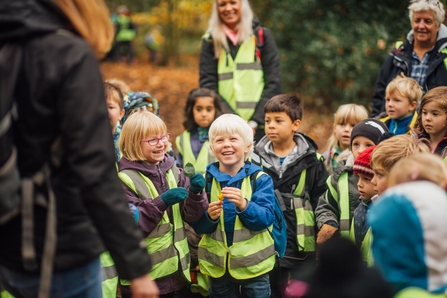The strategy is intended to shape how environmental issues are taught in schools. Currently, there are no requirements to help children develop a deeper knowledge and understanding of the natural world.
Also absent are minimum standards for outdoor learning, despite years of evidence showing how beneficial it is for children’s health, confidence, and well-being. Children’s interaction with nature is also declining, with 60% of young people spending less time outdoors since the start of the pandemic.
At COP26 in Glasgow last year, ministers for education and climate committed to: “the integration of sustainability and climate change in formal education systems.”
The Wildlife Trusts are concerned the Government is at risk of failing to put climate and nature at the heart of education in the UK and are calling for:
- A GCSE that focuses specifically on nature and climate
- A minimum standard for outdoor learning, with children given opportunities to spend at least an hour a day learning outside
- Nature and climate education to be embedded across all subjects and at all levels
Despite widespread support, little progress has been made to include a nature GCSE in the curriculum and further delay could see the idea abandoned altogether.
Craig Bennett, Chief Executive of The Wildlife Trusts, says:
"The nature crisis and the climate emergency are inextricably linked. It's bad enough that we are leaving such an appalling, toxic, denuded inheritance for the next generation. But what's worse is that, in general, we're not even providing young people with the sort if education that will be needed to help them do something about it.
“For too long, nature has been largely ignored in education with far reaching consequences for the environment and for our own wellbeing.
“The natural history GCSE should have happened by now as should an increase in outdoor learning provision.
“The Government has the evidence that proves why these things are vital and has made international commitments on climate education – it must delay no longer. Nature should be at the heart of our education system and it’s tragic that has been neglected for so long.”
In this region, Julia Carr Northumberland Wildlife Trust Education Officer says:
“Nature should be entwined into every subject and at every level of education. We also need a new generation of naturalists, scientists, and innovators to help us restore our natural world, and develop solutions to the environmental and social impacts of climate change.”
“To save our world, we must evolve how and what we teach. Now is the moment to boost learning about nature, benefitting pupils, society, and our planet.”
The 2021 Dasgupta review, The Economics of Biodiversity, concluded on education: “Every child in every country is owed the teaching of natural history, to be introduced to the awe and wonder of the natural world, to appreciate how it contributes to our lives.”

